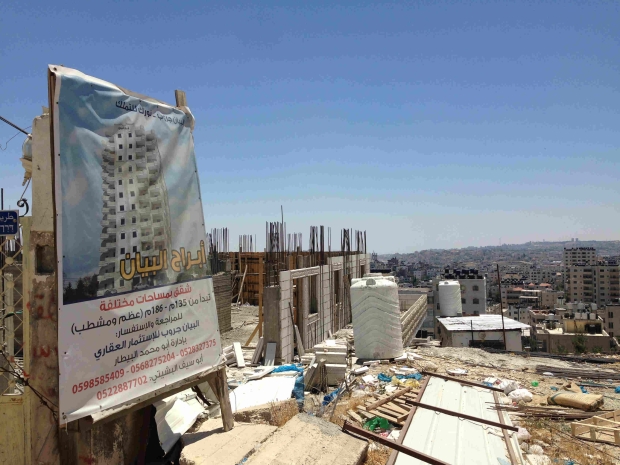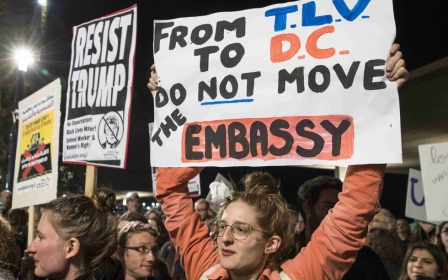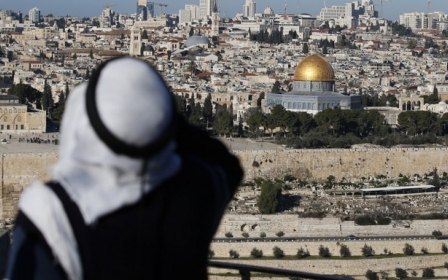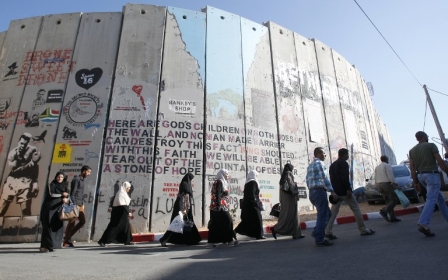Life beyond the wall: Israel neglecting Palestinian residents of Jerusalem
While technically part of Jerusalem, Kafr Aqab, at the northern most edge of the municipality, finds itself neglected and cut off from the city’s services, divided as it is by the separation wall, demarcating West Bank proper from Israel.
Outside Raed Abdullah’s hardware store in the Palestinian village, the smell of burning rubbish is arresting – the acrid odour hits the roof of the mouth, and especially stings the palates of those fasting for Ramadan.
Abdullah says he called the municipality five days ago to complain about the situation.
“I called, and told them where it is and that it is spreading diseases, but no one has come to do anything about it,” he tells Middle East Eye.
Kafr Aqab was occupied by Israel during the Six Day War, 50 years ago this week, and incorporated into the newly expanded municipal limits of Jerusalem at their very northern edge. Therefore, when Israel unilaterally annexed the city’s eastern half, the village became part of what Israel considers to be its "eternal and undivided capital".
However, when Israel constructed a wall through large parts of the occupied West Bank in the early 2000s, Kafr Aqab was among some of Jerusalem’s Palestinian neighbourhoods that found themselves cut off from the city by it.
Life before the wall
Though its 60,000 residents have kept their Jerusalem ID cards – and have kept paying taxes – they have stopped receiving most services from the municipality, many say.
“Before the wall, life here was very nice,” says Abdullah. “There was cleanliness, there were services, there was law. But when the wall and the checkpoint came, life became very complicated.”
The area’s residents now exist in a sort of no-man’s land: the Israeli army will enter to arrest people for security-related offences, but the Israeli police will not attend calls about domestic crime, and the Palestinian police are not permitted by Israel to operate in the area.
Sameh Abu Rumeilah, a member of the local council for the part of the village that falls under the control of the Palestinian Authority, tells Middle East Eye that crime was rife in the area outside the PA’s jurisdiction.
“There’s no security here. There are drugs. There is lots of social trouble. Violence against women. Whatever you look for, you will find in Kafr Aqab, unfortunately.”
He says that hundreds of fugitives from the Palestinian authorities live in the area as they are safe from arrest.
Another aspect of this lawlessness is a rash of illegal construction.
'There’s no security here. There are drugs. There is lots of social trouble. Violence against women. Whatever you look for, you will find in Kafr Aqab, unfortunately'
- Sameh Abu Rumeilah, a member of the local council
Though the municipality provides some services – such as health clinics and minor repairs to roads – building inspectors no longer work in the area. That means that unlike other areas of East Jerusalem, where Palestinian construction is heavily policed, there has been a boom in building here.
Cranes and cement trucks are everywhere, pulling up crowds of high-rise towers, clad in white stone and topped with clusters of black water tanks.
“The people who build here are all crooks. They don’t have the proper ownership of the land, let alone the permits,” says Abu Rumeilah.
Nowhere for kids to play
Manal, a resident, said that conditions are terrible for her children. “There is no place here for them to play, apart from the streets or up in the apartment buildings. The streets are dangerous, and the buildings are not always safe either,” she says, citing the recent death of a girl who had fallen from the seventh floor of a nearby building.
It may not seem like an attractive area to move to, but for Jerusalem’s Palestinians, areas such as Kafr Aqab provide a refuge. In a city where four in five Palestinians are living below the poverty line, as many as 140,000 are now thought to live in areas beyond the wall – out of a total 316,000 Palestinians in East Jerusalem, according to the Israeli government.
Items in stores here can be up to 30 percent cheaper and rents are considerably lower than in more central parts of Jerusalem, before the wall.
'Centre of life' is the standard that the Israeli authorities ask East Jerusalem's Palestinians to prove if there's a dispute about where they reside. This means they have to show that Israel - and this includes East Jerusalem, in the Israeli government's view - is where the person is based for most of the time. Palestinians are asked to prove this through rental contracts, bills, tax payments, and registration of children in schools
Additionally, residence in an area that is still considered by the Israeli government to be part of Israel ensures that the residents meet the so-called "centre of life" test, and continue to qualify not only for Israeli social benefits, but for their status as residents.
S and R are a Palestinian couple who moved to Ramallah, in the occupied West Bank, in the early 1980s. S is a resident of East Jerusalem, while R is an Israeli citizen. At that time there was no requirement to maintain a centre of life inside Israel, but this changed after 1995.
The first time S discovered his residency status - and his wife’s social benefits - were under threat was at the local health centre.
“I went to the clinic and was told that my health insurance had been discontinued,” S says.
“We hadn’t been paying the arnona [Israeli municipal property tax] because we were in Ramallah.”
The couple, not wanting to give up their home of 30 years, decided to temporarily rent an additional flat in Kafr Aqab, in order to attempt to qualify for social security.
The couple eventually secured their benefits after successfully navigating a series of surprise visits from a municipal inspector – who nevertheless already seemed to know about their Ramallah house. They continue to pay the arnona on the Kafr Aqab property in order not to risk the process starting again.
In contrast to Palestinians with Jerusalem residency or Israeli citizenship who live in the West Bank, Jewish Israelis living in West Bank settlements, considered illegal under international law, are not deemed to have moved their centre of life outside of Israel.
Though it is common for the provision of municipal services to be contingent on payment of a property tax, the loss of other social benefits - and the right to access your home city - appears unusual and seems to disproportionately affect Palestinians in this context.
As of 2013, some 14,000 Palestinians from East Jerusalem had lost their residency status in the city since 1967, the majority since 1995, according to Israeli human rights group B'Tselem.
The Jerusalem Municipality says it has invested heavily in the eastern half of the city during the tenure of the current mayor Nir Barkat, citing hundreds of millions of shekels of investment in roads, hundreds of classrooms opened and a recently implemented initiative to name hundreds of streets.
Governmental embarrassment
“Unfortunately, the ability to work to close the gaps in areas of the city that fall outside of the security fence provides additional difficulties because of the security challenges,” reads a statement provided to Middle East Eye. “The municipality constantly works to address these challenges at the highest political level.”
Residents cite the street name project as a reason they do not believe the municipality’s arguments about security. “People from the municipality came here to put up signs – so if they’re able to come, why can’t others?” asks Abdullah.
Daniel Seidemann, an Israeli attorney specialising in geopolitical Jerusalem, says that the situation is embarrassing for the government, but that its power to change it is limited.
“They’re not going to be able to change the status of these people as Jerusalem residents. What they’re talking about now is creating sub-municipalities, which will give the fiction of Palestinian self-rule. It’s all geared to absolve Israel of their responsibilities, and is another desperate gesture to deny the occupation.”
“There used to be life here,” says Abu Rumeilah, the local council member. “The richest Jerusalemites had houses here. You knew your neighbours. Now there’s no life here at all.”
New MEE newsletter: Jerusalem Dispatch
Sign up to get the latest insights and analysis on Israel-Palestine, alongside Turkey Unpacked and other MEE newsletters
Middle East Eye delivers independent and unrivalled coverage and analysis of the Middle East, North Africa and beyond. To learn more about republishing this content and the associated fees, please fill out this form. More about MEE can be found here.






